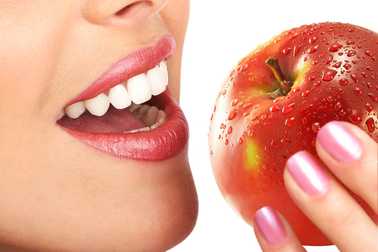 One of the most commonly misunderstand concepts of good oral hygiene is that one should avoid sugar at all costs. Why? Well, sugar causes tooth decay. Yes, that is true, but did you know that most diet sodas are one-tenth as strong as battery acid? How good do you think that is for your teeth? You guessed it, not at all! Furthermore, once tooth enamel has become weakened by sugar and acid, we see a lot of damage caused by hard candy or other tough foods. Throw in the double-whammy of the fact that most people with a diet high in sugar and diet sodas are not getting enough of the right nutrients, and you’ve created an environment that will very likely lead to cavities. Here’s what happens: You get up in the morning and brush your teeth before leaving for work. On the way to work, you stop for a cup of coffee, maybe a muffin. If you’re like most people, you don’t have or take the time to brush your teeth immediately. What’s happening in your mouth is that that food leaves a film that becomes bacterial in nature, also known as plaque. The next thing you know it’s time for lunch. You grab a sandwich, maybe some chips, and a diet soda. When the plaque that has been building up all morning comes into contact with these new sugars, (from the sandwich and chips), acid is produced which attacks the enamel on your teeth. This process takes about 20 minutes, and, if nothing is done, the attack can eventually result in tooth decay. The more often you eat and the longer foods are in your mouth, the more damage occurs. Now imagine that you skip the step of the bacteria and sugar and go straight to the acid attacking the enamel. That’s what you’re doing when you drink diet sodas. Even if no plaque is present, for each sip of diet soda, the acid gets to eat on your enamel for 20 minutes. Getting the picture? So what’s the answer? Here are 8 suggestions for good dental-diet habits.
If you have further questions about how your diet affects your dental health, please contact us at Flemingsburg Dental Care.
1 Comment
|
Articles
All
AuthorDr. Moorhead and his team write about dental news, and answer patient questions. Archives |

 RSS Feed
RSS Feed